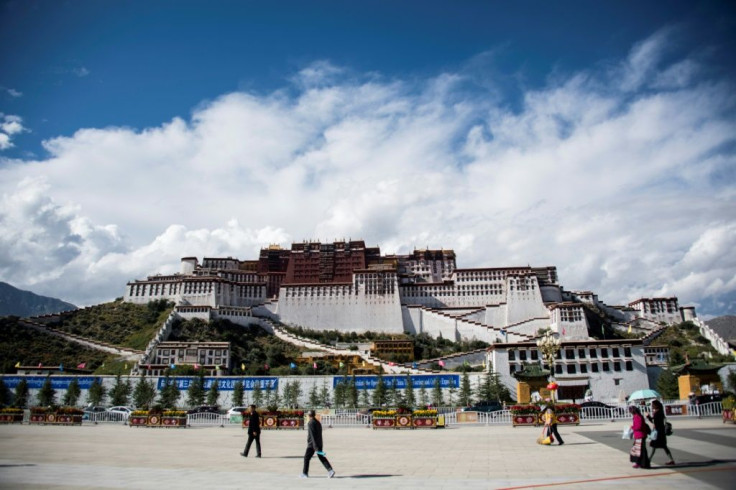Chinese Choppers In Show Of Force Over Tibet Amid Heat From US Law, Free Tibet Elections
KEY POINTS
- China is angered by the U.S. Tibetan Policy and Support Act of 2020
- Act backs the right of the people of Tibet to choose a successor to the Dalai Lama
- Hundreds of Tibetans in exile voted in Dharamshala, India, to elect a new political leader
- China has attempted to wipe out Tibet's culture and Buddhism
- China used force to quell a rebellion in Tibet in 2008
The People's Liberation Army Tuesday flew choppers over the Tibetan capital of Lhasa, in a possible attempt to intimidate the local populace and assert control, days after U.S. Congress passed a bill backing the Tibetian cause and the Dalai Lama, and hundreds of Tibetans in exile in India voted to elect a new political ruler.
China invaded Tibet in 1950 and the Dalai Lama, the Himalayan kingdom's then ruler and spiritual head, and a large group of people fled to India in 1959 after a failed uprising against Chinese rule. For decades China has attempted to destroy ethnic Tibetan culture and religion and fill the country with Han Chinese but has not been fully able to stamp down Tibetans' demand for freedom. Beijing last used its military to quell unrest in the region in 2008, killing dozens of Tibetans.
According to the Hindustan Times, Beijing's latest move is aimed at reminding Tibetans of the military force it can bring to bear in case the local populace is emboldened to protest against Chinese occupation. The election for the new political leader was held on Jan. 3 in Dharamshala, a city in the Himachal Pradesh state of India.
Reports had quoted Lobsang Sangay, the Tibetan political leader who is soon completing his second and final term, as saying: “By this, we are sending a clear message to Beijing that Tibet is under occupation but Tibetans in exile are free. And given a chance, an opportunity, we prefer democracy.”
The Communist party-backed mouthpiece Global Times quoted observers who said the election will not affect the Chinese central government's policies in Tibet as the country has a comprehensive system and measures to face any challenges about the safety and development of Tibet Autonomous Region.
Chinese President Xi Jinping in September last year called for further Sinicisation of Tibet, a campaign aimed to tighten grip on the religious community. He had stressed on Buddhism with Chinese characteristics in Tibet, which the Free Tibet government in exile views as a threat to the Buddhist culture and values of the region. The drill also comes a day after Xi Jinping signed a mobilization order for the training of armed forces, which stressed strengthening military training in real combat conditions and the ability to win.
China is especially wary because it is now engaged in a border standoff with India in Tibet and the Indian army had used a special forces unit, raised from Tibetan refugees in the country, to occupy some key heights in Ladakh and nullify the advantages that the People's Liberation Army had gained through its intrusions. Reports said the Tibetan soldiers of the Indian army, who are accustomed to the rarefied Himalayan heights, even waved the Tibetan flag at the PLA troops after outmaneuvering the latter and occupying strategic heights.
The Tibetan Policy and Support Act of 2020 backs the rights of the people of Tibet to choose a successor to the Dalai Lama and any interference by the Chinese government will be met with serious sanctions.
China has responded to the Act, accusing the U.S. government of meddling in its internal affairs. “We urge the U.S. side to stop meddling in China’s internal affairs and refrain from signing into law these negative clauses and acts, lest it further harms our further cooperation and bilateral relations,” Chinese foreign ministry spokesman Wang Wenbin said.
China also reacted sharply to what it called "Indian media supporting the U.S. legislation and advocating Indian interference in China’s Tibet (Xizang) affairs”. The Chinese Embassy in New Delhi said it hoped Indian media would take an objective and fair stance on issues concerning China’s sovereignty and territorial integrity.
"We hope Indian media grasp the highly sensitive nature of Xizang-related issues, look at Xizang’s economic and social progress objectively, do more to help China-India bilateral relations move forward instead of advocating playing ‘Tibet card’ to meddle in China’s internal affairs and further damage the bilateral relations,” the statement read.

© Copyright IBTimes 2024. All rights reserved.











